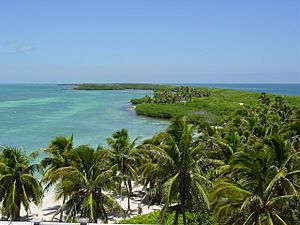Quintana Roo facts for kids
Quick facts for kids
Quintana Roo
|
|||
|---|---|---|---|
| Estado Libre y Soberano de Quintana Roo | |||
|
|||
| Anthem: Himno a Quintana Roo | |||
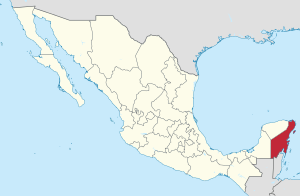
State of Quintana Roo within Mexico
|
|||
| Country | Mexico | ||
| Capital | Chetumal | ||
| Largest city | Cancún | ||
| Municipalities | 11 | ||
| Admission | October 8, 1974 | ||
| Order | 30th | ||
| Area | |||
| • Total | 34,205 km2 (13,207 sq mi) | ||
| Ranked 19th | |||
| Highest elevation | 230 m (750 ft) | ||
| Population
(2015)
|
|||
| • Total | 1,501,562 | ||
| • Rank | 26th | ||
| • Density | 43.8989/km2 (113.6976/sq mi) | ||
| • Density rank | 24th | ||
| Demonym(s) | Quintanarroense | ||
| Time zone | UTC−5 (EST) | ||
| Postal code |
77
|
||
| Area code |
Area codes
|
||
| ISO 3166 code | MX-ROO | ||
| HDI | |||
| GDP | US$ 10,286,552.031 th | ||
| a. The state's GDP was $131,667,866 thousand of pesos in 2008, amount corresponding to $10,286,552.031 thousand of dollars, being a dollar worth 12.80 pesos (value of June 3, 2010). | |||
Quintana Roo, officially known as the Free and Sovereign State of Quintana Roo, is one of Mexico's 32 states. It is divided into 11 municipalities. Its capital city is Chetumal.
Quintana Roo is located on the eastern side of the Yucatán Peninsula. It shares borders with the states of Campeche to the west and Yucatán to the northwest. To the south, it borders the Orange Walk and Corozal districts of Belize. Quintana Roo also has a coastline along the Caribbean Sea to the east and the Gulf of Mexico to the north. This state is Mexico's easternmost point.
This beautiful state is home to famous places like Cancún, the islands of Cozumel and Isla Mujeres, and towns such as Bacalar and Playa del Carmen. You can also explore ancient Maya ruins here, including Chacchoben, Cobá, Tulum, and Xcaret. The Sian Ka'an nature reserve is also found in Quintana Roo.
The number of people living in Quintana Roo is growing fast. This is because many new hotels are being built, creating jobs. People from other Mexican states like Yucatán and Veracruz move here for work. Due to its location, the state can be hit by strong hurricanes. One of the most powerful was Hurricane Dean in 2007.
Contents
History of Quintana Roo: From Territory to State
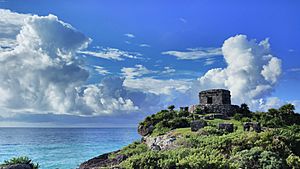
The area we now call Quintana Roo was once part of the larger Yucatán region. It shared a long history with Yucatán. In the 1840s, a conflict known as the Caste War of Yucatán began. During this time, many non-native people left the region.
The Independent Maya Nation
An independent Maya nation called Chan Santa Cruz was formed in what is now Felipe Carrillo Puerto. For many years, this Maya nation was quite independent. It even had its own trade and agreements with British Honduras, which is now Belize.
Becoming a Mexican Territory
On November 24, 1902, President Porfirio Díaz declared Quintana Roo a territory of Mexico. It was named after Andrés Quintana Roo, an important Mexican patriot. The Mexican army worked to bring the Maya population in the region under control during the 1910s. In 1915, the area was once again legally made part of the state of Yucatán.
Quintana Roo Becomes a State
Finally, on October 8, 1974, Quintana Roo officially became a state within the United Mexican States. This makes it the youngest state in Mexico.
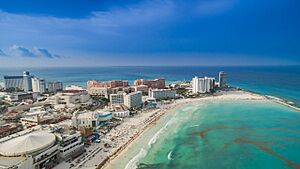
Geography and Climate of Quintana Roo
Understanding Quintana Roo's Climate
Most of Quintana Roo has a tropical wet and dry climate. This means it has a rainy season and a dry season. The island of Cozumel has a slightly different climate, known as a tropical monsoon climate.
The average temperature throughout the year is about 26 degrees Celsius (79 degrees Fahrenheit). The hottest months are April and August, with average highs around 33 degrees Celsius (91 degrees Fahrenheit). January is the coolest month, with average lows around 17 degrees Celsius (63 degrees Fahrenheit). Temperatures can sometimes reach 36 degrees Celsius (97 degrees Fahrenheit) in hot months or drop to 10 degrees Celsius (50 degrees Fahrenheit) in cold months.
Quintana Roo gets about 1,300 millimeters (51 inches) of rain each year. Rain falls throughout the year, but June to October are the wettest months. Hurricanes can sometimes affect the coastal areas, especially from September to November, during the Atlantic hurricane season.
Municipalities of Quintana Roo
The State of Quintana Roo is divided into 11 municipalities. Each municipality is led by a municipal president.
- Bacalar
- Benito Juarez
- Othón P. Blanco
- Puerto Morelos
- Cozumel
- Felipe Carrillo Puerto
- Isla Mujeres
- Solidaridad
- Tulum
- José María Morelos
- Lázaro Cárdenas
Tourism and Nature in Quintana Roo
The Rise of Tourism
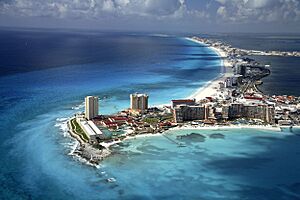
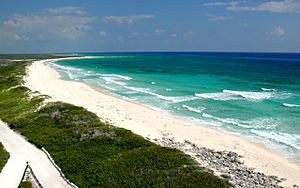
Quintana Roo became a popular tourist spot in the 1970s. Tourism has led to many hotels and resorts being built along the coast. It has also boosted ecotourism in the inland and coastal areas. This growth has helped the region's economy a lot. Quintana Roo ranks high among Mexican states for human development.
The Riviera Maya is a famous coastal area in Quintana Roo. It includes popular places like Cancún, Playa del Carmen, and Cozumel.
There are many ancient Mayan sites to explore in Quintana Roo. These include Chacchoben, Coba, Tulum, and Xcaret.
Protecting Quintana Roo's Nature
The Yucatán Peninsula has many forests. However, experts say that Quintana Roo is facing a "faunal crisis." This means that many medium to large animals are disappearing. This is due to hunting and the loss of their natural homes, called habitat loss.
Even though Quintana Roo has a small population, more people are moving there, and tourism is growing. This puts more pressure on the local plants and animals.
Ecosystems and Animals of Quintana Roo
Quintana Roo has four main types of natural environments, called ecosystems. These are tropical forests (or jungles), savannas, mangrove forests, and coral reefs. Tourism has made Quintana Roo famous for its beautiful beaches, coastline, and unique cenote sinkholes.
The coastline of Quintana Roo is known as one of the best places for manatees in the world. Queen conchs also live in the coastal areas. Sadly, the number of these amazing creatures has greatly decreased in the last fifteen years.
Bird Life in Quintana Roo
Birds are another important part of Quintana Roo's wildlife. Hundreds of bird species live here all year round. Many more birds visit during winter or stop here on their long journeys to South America. This makes Quintana Roo a popular place for birdwatchers.
The Impact of Development

Some people blame the environmental damage in Quintana Roo on the government or outside investors. However, the resorts and hotels have created many jobs. They have also increased economic activity, which has led to growth.
When tourism started, people were very hopeful about Quintana Roo's economy. The state has many attractions, from ancient Mayan ruins to lush forests and beautiful beaches. But the long-term effects on the environment were not fully considered. The impact of development and population growth was largely ignored. The effect on the native Maya people was also not properly thought about. The economic challenges faced by the Maya have affected their sense of belonging and identity.
Flora and Fauna of Quintana Roo
| Flora and fauna of Quintana Roo | |||||||
 |
 |
 |
 |
 |
|||
| Trichechus manatus | Mazama pandora | Eretmochelys imbricata | Crax rubra | Crocodylus acutus | |||
 |
 |
 |
 |
 |
|||
| Ateles geoffroyi | Sarcoramphus papa | Tamandua mexicana | Nasua narica | Boa constrictor | |||
 |
 |
 |
 |
 |
|||
| Ceiba pentandra | Enterolobium cyclocarpum | Rhizophora mangle | Haematoxylum campechianum | Bixa orellana | |||
Images for kids
See also
 In Spanish: Quintana Roo para niños
In Spanish: Quintana Roo para niños
 | Lonnie Johnson |
 | Granville Woods |
 | Lewis Howard Latimer |
 | James West |




